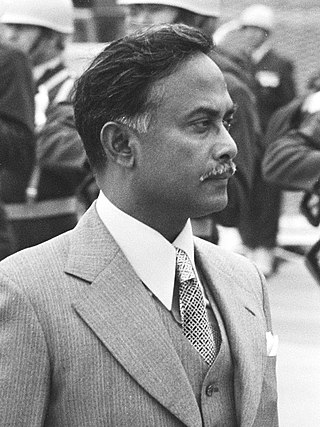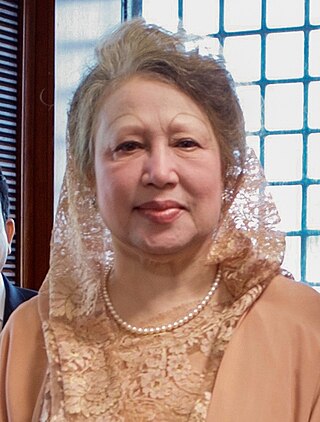
Politics of Bangladesh takes place in a framework of a parliamentary representative democratic republic, whereby the Prime Minister of Bangladesh is the head of government, and of a multi-party system. Executive power is exercised by the government. Legislative power is vested in both the government and parliament. The Constitution of Bangladesh was written in 1972 and has undergone seventeen amendments.

Iajuddin Ahmed was the President of Bangladesh, serving from 6 September 2002 until 12 February 2009. From late October 2006 to January 2007, he also served as Chief Advisor of the caretaker government. From October 2006 to early 2008, his responsibilities as president included the Defense Ministry of the caretaker government.

Ziaur Rahman was a Bangladeshi military officer and politician who served as the President of Bangladesh from 1977 until his assassination. He was the founder of the Bangladesh Nationalist Party (BNP) and served as its chairman until his assassination. He previously served as the second chief of army staff from 1975 to 1978 with a minor break.

Begum Khaleda Zia is a Bangladeshi politician who served as the prime minister of Bangladesh from March 1991 to March 1996, and again from June 2001 to October 2006. She was the first female prime minister of Bangladesh and second female prime minister in the Muslim world, after Benazir Bhutto. She is the widow of former president of Bangladesh Ziaur Rahman. She is the chairperson and leader of the Bangladesh Nationalist Party (BNP) since 1984, which was founded by her late husband in 1978.

The prime minister of Bangladesh, officially prime minister of the People's Republic of Bangladesh is the chief executive of the government of Bangladesh. The prime minister and the cabinet are collectively accountable for their policies and actions to the Parliament, to their political party and ultimately to the electorate. The prime minister is ceremonially appointed by the president of Bangladesh.

Hussain Muhammad Ershad was a Bangladeshi military officer and politician who served as the president of Bangladesh from 1983 to 1990, heading a military dictatorship.

Bangladesh has undergone several changes of government since the Proclamation of Independence in 1971. Between the first recorded uprising in August 1975 and the last known attempt in December 2011, Bangladesh has been through as many as 29 military coups.
Abdur Rahman Biswas was a Bangladeshi politician. He was the President of Bangladesh from 1991 to 1996. Biswas represented Pakistan at the United Nations General Assembly prior to the independence of Bangladesh.

General elections were held in Bangladesh on 29 December 2008. The two main parties in the election were the Bangladesh Nationalist Party (BNP), led by Khaleda Zia, and the Bangladesh Awami League Party, led by Sheikh Hasina. The Bangladesh Awami League Party formed a fourteen-party Grand Alliance including Ershad's Jatiya Party, while the BNP formed a four-party alliance which included the Islamist party Jamaat-e-Islami. The election was originally scheduled for January 2007, but it was postponed by a military-controlled caretaker government for an extended period of time.

The 2006–2008 Bangladeshi political crisis began as a caretaker government (CTG) assumed power at the end of October 2006 following the end of term of the Bangladesh Nationalist Party administration. The BNP government increased the chief justice's retirement age in an unconstitutional way to bias the appointment of the head of the caretaker government. CTG manages the government during the interim 90-day period and parliamentary elections. Political conflict began with the alleged appointment of a Chief Advisor, a role which devolved to the President, Dr. Iajuddin Ahmed. The interim period was marked from the beginning by violent protests initiated by the Awami League named Logi Boitha Andolan, with 40 people killed and hundreds injured in the first month. The Bangladesh Nationalist Party had its own complaints about the process and the opposition.

Fakhruddin Ahmed is a Bangladeshi economist, civil servant, and a former governor of the Bangladesh Bank, the country's central bank. He also served as the acting prime minister of Bangladesh.
Hasan Mashhud Chowdhury was a Bangladesh Army general who was 12th Chief of Army Staff of the Bangladesh Army from 16 June 2002 to 15 June 2005. He was the last officer to serve in this position who had first been commissioned by and served with the Pakistani Army, before the Liberation War of 1971. He served for two years before the war.

Mahfuz Anam is a Bangladeshi journalist. He serves as editor and publisher of The Daily Star, one of Bangladesh's largest circulating English-language newspapers. After working in the United Nations for 14 years, Anam co-founded the newspaper with his mentor Syed Mohammad Ali in 1991 during Bangladesh's democratic transition. His criticism of the country's two largest political parties and the military has often resulted in him being sued; Anam dismisses the charges and the suits as attacks on press freedom. He was elected for a second term as chairman of the Asia News Network in 2022 and 2023.

The caretaker government of Bangladesh was a form of government in which Bangladesh used to be ruled by a selected government for an interim period during the transition from one elected government to another, after the completion of tenure of the former, during the period between 1996 and 2008. The outgoing elected government used to hand over its power to the nonelected nonpartisan caretaker government (CTG).

The history of Bangladesh (1971–present) refers to the period after the independence of Bangladesh from Pakistan.

Mukhlesur Rahman Chowdhury, also known as Mokhles Chowdhury, is a Bangladeshi journalist and editor. He served as Press Secretary of the President Iajuddin Ahmed. Mukhles Chowdhury performed as an advisor to the President Iajuddin Ahmed during the Caretaker Government established in October 2006.
Sadik Hasan Rumi is a former Major General of Bangladesh Army who served as Director General of Directorate General of Forces Intelligence (DGFI) from May 2002 to May 2007.
Syed Fatemi Ahmed Rumi is a retired major general of the Bangladesh Army and former director general of Special Security Force.
Operation Dal-Bhat was an operation carried out by Bangladesh Rifles to provide grocery items to low income groups in Bangladesh. The operation was carried out during the Caretaker Government of Fakhruddin Ahmed. It was one of the main reasons behind the Bangladesh Rifles Mutiny of 2009. Colonel Mujibul Haque who was killed in the mutiny was in charge of the operation. The mutineers demanded their share of the profits from the operation.
The 1996 Bangladesh coup d'état attempt was a coup attempt in Bangladesh. The coup was launched by Army Chief of Staff Abu Saleh Mohammad Nasim against the President of Bangladesh Abdur Rahman Biswas. The coup failed and the Army chief of Staff was dismissed.

























